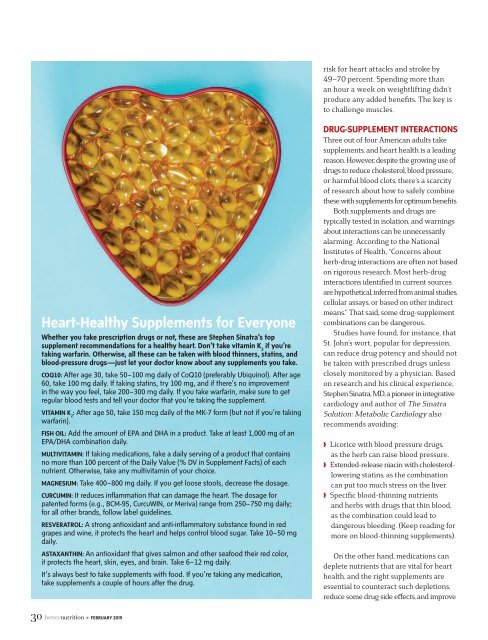Create successful ePaper yourself
Turn your PDF publications into a flip-book with our unique Google optimized e-Paper software.
isk for heart attacks and stroke by<br />
49–70 percent. Spending more than<br />
an hour a week on weightlifting didn’t<br />
produce any added benefits. The key is<br />
to challenge muscles.<br />
Heart-Healthy Supplements for Everyone<br />
Whether you take prescription drugs or not, these are Stephen Sinatra’s top<br />
supplement recommendations for a healthy heart. Don’t take vitamin K 2<br />
if you’re<br />
taking warfarin. Otherwise, all these can be taken with blood thinners, statins, and<br />
blood-pressure drugs—just let your doctor know about any supplements you take.<br />
COQ10: After age 30, take 50–100 mg daily of CoQ10 (preferably Ubiquinol). After age<br />
60, take 100 mg daily. If taking statins, try 100 mg, and if there’s no improvement<br />
in the way you feel, take 200–300 mg daily. If you take warfarin, make sure to get<br />
regular blood tests and tell your doctor that you’re taking the supplement.<br />
VITAMIN K 2<br />
: After age 50, take 150 mcg daily of the MK-7 form (but not if you’re taking<br />
warfarin).<br />
FISH OIL: Add the amount of EPA and DHA in a product. Take at least 1,000 mg of an<br />
EPA/DHA combination daily.<br />
MULTIVITAMIN: If taking medications, take a daily serving of a product that contains<br />
no more than 100 percent of the Daily Value (% DV in Supplement Facts) of each<br />
nutrient. Otherwise, take any multivitamin of your choice.<br />
MAGNESIUM: Take 400–800 mg daily. If you get loose stools, decrease the dosage.<br />
CURCUMIN: It reduces inflammation that can damage the heart. The dosage for<br />
patented forms (e.g., BCM-95, CurcuWIN, or Meriva) range from 250–750 mg daily;<br />
for all other brands, follow label guidelines.<br />
RESVERATROL: A strong antioxidant and anti-inflammatory substance found in red<br />
grapes and wine, it protects the heart and helps control blood sugar. Take 10–50 mg<br />
daily.<br />
ASTAXANTHIN: An antioxidant that gives salmon and other seafood their red color,<br />
it protects the heart, skin, eyes, and brain. Take 6–12 mg daily.<br />
It’s always best to take supplements with food. If you’re taking any medication,<br />
take supplements a couple of hours after the drug.<br />
DRUG-SUPPLEMENT INTERACTIONS<br />
Three out of four American adults take<br />
supplements, and heart health is a leading<br />
reason. However, despite the growing use of<br />
drugs to reduce cholesterol, blood pressure,<br />
or harmful blood clots, there’s a scarcity<br />
of research about how to safely combine<br />
these with supplements for optimum benefits.<br />
Both supplements and drugs are<br />
typically tested in isolation, and warnings<br />
about interactions can be unnecessarily<br />
alarming. According to the National<br />
Institutes of Health, “Concerns about<br />
herb-drug interactions are often not based<br />
on rigorous research. Most herb-drug<br />
interactions identified in current sources<br />
are hypothetical, inferred from animal studies,<br />
cellular assays, or based on other indirect<br />
means.” That said, some drug-supplement<br />
combinations can be dangerous.<br />
Studies have found, for instance, that<br />
St. John’s wort, popular for depression,<br />
can reduce drug potency and should not<br />
be taken with prescribed drugs unless<br />
closely monitored by a physician. Based<br />
on research and his clinical experience,<br />
Stephen Sinatra, MD, a pioneer in integrative<br />
cardiology and author of The Sinatra<br />
Solution: Metabolic Cardiology also<br />
recommends avoiding:<br />
Licorice with blood pressure drugs,<br />
as the herb can raise blood pressure.<br />
Extended-release niacin with cholesterollowering<br />
statins, as the combination<br />
can put too much stress on the liver.<br />
Specific blood-thinning nutrients<br />
and herbs with drugs that thin blood,<br />
as the combination could lead to<br />
dangerous bleeding. (Keep reading for<br />
more on blood-thinning supplements).<br />
On the other hand, medications can<br />
deplete nutrients that are vital for heart<br />
health, and the right supplements are<br />
essential to counteract such depletions,<br />
reduce some drug side effects, and improve<br />
30 • FEBRUARY <strong>2019</strong>

















